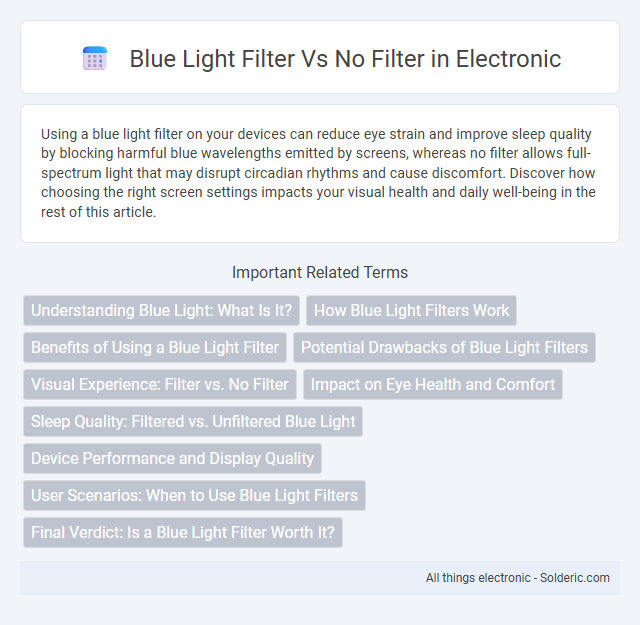Using a blue light filter on your devices can reduce eye strain and improve sleep quality by blocking harmful blue wavelengths emitted by screens, whereas no filter allows full-spectrum light that may disrupt circadian rhythms and cause discomfort. Discover how choosing the right screen settings impacts your visual health and daily well-being in the rest of this article.
Comparison Table
| Feature | Blue Light Filter | No Filter |
|---|---|---|
| Eye Strain Reduction | Reduces eye fatigue and dryness | No reduction; eyes prone to strain |
| Sleep Quality | Improves sleep by reducing blue light exposure | May disrupt sleep patterns |
| Screen Color | Warmer tones; slight yellow tint | True screen colors with no alteration |
| Usage Duration | Supports prolonged screen time comfortably | Long use may cause discomfort and fatigue |
| Device Compatibility | Available on most smartphones, tablets, and computers | Applies to all devices by default |
| Blue Light Exposure | Significantly reduced blue light emission | Full blue light emission without filtering |
Understanding Blue Light: What Is It?
Blue light is a high-energy visible (HEV) light emitted by digital screens, LED bulbs, and the sun, characterized by short wavelengths that can cause eye strain and disrupt sleep patterns. Using a blue light filter reduces exposure to this intense light, minimizing digital eye fatigue and improving your overall visual comfort during screen time. Without a filter, prolonged exposure to blue light may increase the risk of retinal damage and negatively impact your circadian rhythm.
How Blue Light Filters Work
Blue light filters reduce exposure to high-energy visible (HEV) blue light emitted by screens by altering the light spectrum, typically through a special coating on lenses or screen protectors that selectively absorbs or blocks blue wavelengths between 400-495 nanometers. This reduction minimizes eye strain, digital eye fatigue, and potential disruption to circadian rhythms caused by prolonged screen use, especially in low-light conditions. Without a blue light filter, eyes endure direct exposure to intense blue light, which can lead to increased discomfort and sleep disturbances.
Benefits of Using a Blue Light Filter
Using a blue light filter reduces eye strain by minimizing exposure to high-energy blue light emitted from screens, which decreases the risk of digital eye fatigue and dryness. It helps improve sleep quality by regulating circadian rhythms, as blue light exposure before bedtime can suppress melatonin production, leading to difficulty falling asleep. Prolonged use of blue light filters also reduces potential retinal damage, supporting long-term eye health and comfort during extensive screen time.
Potential Drawbacks of Blue Light Filters
Blue light filters reduce eye strain by limiting exposure to high-energy visible light, but they can also cause color distortion and lower screen brightness, affecting image clarity. Some users may experience headaches or discomfort due to altered color perception when using these filters extensively. Your device's display settings might not accurately reflect content colors, which could impact visual tasks requiring precise color recognition.
Visual Experience: Filter vs. No Filter
Blue light filters reduce eye strain by blocking high-energy blue wavelengths, resulting in a warmer and more comfortable visual experience during prolonged screen use. Without a filter, your eyes are exposed to intense blue light, which can cause dryness, fatigue, and disrupted sleep patterns due to melatonin suppression. Choosing a blue light filter enhances visual comfort and reduces potential long-term damage to your eyes compared to viewing screens without any protection.
Impact on Eye Health and Comfort
Using a blue light filter significantly reduces eye strain and fatigue caused by prolonged exposure to screens, promoting better eye health and comfort. Without a filter, your eyes are more susceptible to dryness, irritation, and disrupted sleep patterns due to increased blue light exposure. Incorporating a blue light filter into your device settings helps maintain visual comfort and protects your eyes from potential long-term damage.
Sleep Quality: Filtered vs. Unfiltered Blue Light
Filtered blue light significantly improves sleep quality by reducing the disruption of melatonin production compared to unfiltered blue light exposure. Studies show that using blue light filters in the evening decreases eye strain and promotes faster sleep onset, enhancing overall restful sleep duration. Without a blue light filter, exposure to high levels of blue light suppresses melatonin, leading to delayed sleep phases and poorer sleep quality.
Device Performance and Display Quality
Using a blue light filter can reduce eye strain by minimizing blue light emissions from the device screen, potentially extending battery life due to lower brightness requirements. However, enabling the blue light filter may slightly alter color accuracy and display vibrancy, impacting visual clarity for tasks requiring precise color representation. Devices without a blue light filter maintain original display quality and color fidelity but might cause increased eye fatigue during prolonged use, especially in low-light environments.
User Scenarios: When to Use Blue Light Filters
Blue light filters reduce eye strain during prolonged screen use, making them ideal for evening activities like reading or browsing to minimize disruption of circadian rhythms. In work scenarios with extensive computer use, blue light filtering enhances visual comfort and decreases fatigue. Conversely, users in color-critical tasks, such as graphic design, may avoid filters to preserve accurate color representation.
Final Verdict: Is a Blue Light Filter Worth It?
A Blue Light Filter significantly reduces exposure to high-energy blue light emitted by screens, which can help alleviate eye strain and improve sleep quality by minimizing melatonin disruption. Scientific studies indicate that using a blue light filter can enhance visual comfort during prolonged screen time, making it beneficial for individuals who spend extensive hours on digital devices. While not essential for everyone, a blue light filter is worth considering for improved eye health and better circadian rhythm regulation.
Blue Light Filter vs No Filter Infographic

 solderic.com
solderic.com